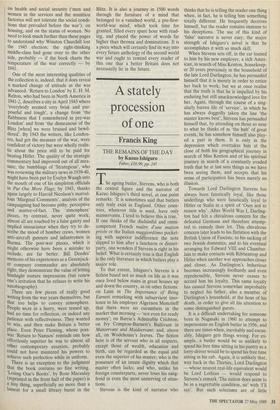A stately procession of one
Francis King
THE REMAINS OF THE DAY by Kazuo Ishiguro
Faber, f10.99, pp. 245
The ageing butler, Stevens, who is both the central figure and the narrator of Kazuo Ishiguro's third novel, at one point remarks: 'It is sometimes said that butlers only truly exist in England. Other coun- tries, whatever title is used, have only manservants. I tend to believe this is true.' If one thinks of the disdainful and omni- competent French maitre d'une maison privee or the Italian maggiorddmo pocket- ing with superior indifference the note slipped to him after a luncheon or dinner- party, one wonders if Stevens is right in his belief. What is certainly true is that English is the only literature in which butlers play a major role.
To that extent, Ishiguro's Stevens is a fiction based not so much on life as it was once lived below stairs in great houses up and down the country, as on other fictions: on Lane in The Importance of Being Earnest remarking with subservient inso- lence to his employer Algernon Moncrieff that there were no cucumbers in the market that morning — 'not even for ready money'; on Barrie's Admirable Crichton; on Ivy Compton-Burnett's Bullivant in Manservant and Maidservant; and, above all, on Wodehouse's Jeeves. The fiction here is of the servant who in all respects, except those of wealth, education and birth, can be regarded as the equal and even the superior of his master; who is the possessor of an innate dignity which that master often lacks; and who, unlike his foreign counterparts, never loses his sang- froid in even the most unnerving of situa- tions.
Stevens is the kind of narrator who thinks that he is telling the reader one thing when, in fact, he is telling him something totally different. He frequently deceives himself, but the reader remains immune to his deceptions. The use of this kind of `false' narrator is never easy; the major strength of Ishiguro's novel is that he accomplishes it with so much skill.
When Stevens sets off, in the car loaned to him by his new employer, a rich Amer- ican, in search of Miss Kenton, housekeep- er 20 years previously in the household of the late Lord Darlington, he has persuaded himself that it is merely in order to entice her back to work; but we at once realise that the truth is that he is impelled by his enduring but still unacknowledged love for her. Again, through the course of a sing- ularly barren life of 'service', in which he has always doggedly taken the line 'the master knows best', Stevens has persuaded himself that, by attending on those so near to what he thinks of as 'the hub' of great events, he has somehow himself also play- ed a part in them. It is only in the depression which overtakes him at the close of both his geographical journey in search of Miss Kenton and of his spiritual journey in search of a constantly evaded truth that he at last sees things as we have been seeing them, and accepts that his sense of participation has been merely an illusion.
Towards Lord Darlington Stevens has always been fanatically loyal, like those underlings who were fanatically loyal to Hitler or Stalin in a spirit of 'Ours not to reason why'. After World War I, Darling- ton had felt a chivalrous concern for the defeated Germans and therefore attemp- ted to remedy their lot. This chivalrous concern later leads to his flirtation with the British Union of Fascists; to his sacking of two Jewish domestics; and to his eventual arranging for Edward VIII and Chamber- lain to make contacts with Ribbentrop and Hitler when another war approaches closer and closer. As Darlington's behaviour becomes increasingly foolhardy and even reprehensible, Stevens never ceases to accord him his loyalty. This same loyalty has caused Stevens somewhat improbably to neglect his father, also a member of Darlington's household, at the hour of his death, in order to give all his attention to some distinguished guests.
It is a difficult undertaking for someone born in Nagasaki in 1960 to attempt to impersonate an English butler in 1956, and there are times when, inevitably and excus- ably, Ishiguro gets things wrong. For ex- ample, a butler would be as unlikely to spend his free time sitting in his pantry as a lorry-driver would be to spend his free time sitting in his cab. Again, it is unlikely that, way back in the Thirties, Lord Darlington — whose nearest real-life equivalent would be Lord Lothian — would respond to Stevens's remark 'The nation does seem to be in a regrettable condition, sir' with 'I'll say'. But such solecisms are of little
account in a novel which has an abundance of a commodity far rarer in English fiction today than 100 or even 50 years ago. This quality is charm.
Allied to this charm are a demure wit and, in the depiction of a man castrated by his sense of duty, a rueful pathos. The tragedy of Stevens is that he has never learned to 'banter' (as he calls the ability to let oneself go and enjoy oneself) and that, at the close of his story, he has realised that `in bantering lies the key to human warmth'. Ishiguro knows how to banter; human warmth irradiates his novel.



















































 Previous page
Previous page